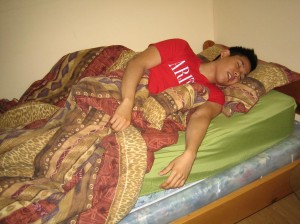Night sweats or excessive perspiration is considered as an uncomfortable part of life for many individuals. It can soak a pillow or blanket that would require the individual to change beddings or clothes. Even though it is not an issue to worry about, it can cause discomfort to many individuals.

Causes of night sweats
In women, it is also called as hot flashes during the phase of menopause. The moment estrogen levels start to diminish in women, the occurrence of night sweats will likely increase.
Night sweats can also be a side effect of some medications such as hormone treatments, antidepressants and hypoglycemic agents. Even excess intake of substances such as illegal drugs and alcohol can also lead to the occurrence of night sweats.
Take note that night sweats are typically connected to conditions that can be treated such as sleep apnea, infections, hypoglycemia and acid reflux. It can also be a symptom of a serious condition such as lymphoma, tuberculosis, types of cancers as well as HIV and AIDS.
When is the best time to seek medical help?
In case an individual experiences night sweats, it is not an issue to worry about. On the other hand, it is best to seek medical care if the night sweats repeatedly occur and can disrupt sleep or if it is accompanied with other symptoms. If it is accompanied by elevated temperature and unexplained weight loss, it can indicate a medical emergency. Do not hesitate to consult your doctor so that the right diagnosis can be provided.
Constant occurrence of night sweats can indicate the start of HIV or that HIV has already developed into AIDS.
Treatment for night sweats
The medical approach for night sweats can help deal with the underlying condition. It is often a side effect that can be treated such as anxiety or menopause but the treatment tends to vary.
Women in the menopausal stage usually undergo hormonal therapy in order to minimize hot flashes. Even though antidepressants can cause night sweats, they can be utilized as a treatment for hot flashes. Other medications used include clonidine and gabapentin.
At home, if an individual experiences night sweats, the blankets should be removed. There should be enough ventilation in the room as well. During the warm weather, it is best to use an air conditioner or simply find a cool place to sleep.
Preventing night sweats
Night sweats that are not caused by illnesses can be prevented. Both alcohol and caffeine can cause night sweats, thus it is important to limit consumption to minimize its occurrence.
The bedroom should have a comfortable temperature. Avoid rooms that are crowded or being positioned too close to a sleeping partner. Lastly, it is best to relax before going to sleep by trying out relaxing activities such as yoga or a hobby that you enjoy.
